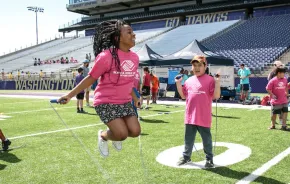
I’m writing this from Corvallis, Ore., between baseball games for my 16-year-old son. It’s one of many tournaments we’ll travel to this summer, culminating with a 10-day trip to San Diego in August. In the fall, our family replaces baseball travel with basketball games and tournaments for my 12-year-old daughter.
I am a sports parent, and these days, that label has been getting an increasingly bad rap — often for good reason. My husband, meanwhile, is a youth sport coach for my daughter’s basketball team, and that label hasn’t been faring any better.
Sports parents are portrayed as aggressive and pushy, bad-mouthing umpires and referees, pressuring coaches to increase their child’s playing time, and — worst of all — pushing their kids into sports too early, with no regard for whether the child is actually having fun.
Youth coaches, meanwhile, are often stereotyped as win-at-all-costs bad guys, screaming at players and officials during games, forcing kids to practice too hard, too often, pressuring them to choose one sport — the coach’s sport — at a young age.
Anyone involved with youth sports has seen this type of behavior from both parents and coaches. The good news is, these people are in the minority. The bad news is, many coaches and sports officials I’ve spoken with recently believe the bad behavior is increasing at an alarming rate.
The bottom line: Kids’ sports are no longer about kids. I’ve been told that several local high school coaches quit this year because they were tired of dealing with unreasonable parents — parents who question everything from their coaching style to game strategy to the amount of time Johnny or Susie plays. I have talked with organizers of youth tournaments who are appalled at the verbal abuse by coaches and players directed at referees and the tournament organizers themselves. I have seen adult coaches of girls’ basketball teams — with players as young as 10 — screaming at referees, their own players and players of other teams.
A sports psychologist I interviewed noted that our emphasis on childhood sports participation is a relatively new societal trend, mirroring the desire of parents to give their kids every early advantage — note the increase in preschool piano lessons and foreign language classes — to succeed. Adding fuel to the fire is our nation’s obsession with professional athletes who pull down multi-million-dollar salaries and are now viewed — for better or worse — as role models.
Childhood sports involvement starts out innocently enough — our kids show an interest in kicking a soccer ball or hitting a wiffle ball in the backyard. We sign them up for “teams” when they are 4 or 5 — they make friends, they have fun and they look so cute in their uniforms.
But everything changes in a few years — parents and coaches start caring about winning, kids with outstanding sports skills are praised and valued, and the pressure is on to make sure your kid doesn’t fall behind and spend most of his or her time on the bench.
The stakes get even higher as youngsters reach high school and are competing for entrance into college athletic programs. As one coach noted, some parents are so intent on their kids getting a full-ride athletic scholarship that they don’t have an alternative plan to pay for college. High school athletes themselves are so caught up in the process that they often don’t have time for anything but sports. Grades and family relationships aren’t as important as practices and competition.
One non-parent working on our ParentMap cover artwork raised the following questions: “When did society start pushing kids this way? When did parents start to buy into this cultural phenom? When did studying start to take a back seat to sports? How can parents recapture the fun?”
How, indeed, do we solve this problem of sports obsession? It starts with empowering our kids to make their own decisions about what sports they play, if any, and how often they play. Parents should be there to guide their kids, of course, and to support them. But they also need to accept the fact that not all kids have the physical skills — or mental desire — to be superstar athletes.
Parents also need to prioritize what is important for their child and their family, and communicate those priorities to the child’s coach. It should be OK to miss an occasional practice or a tournament to study for a test or have a birthday dinner with Grandma.
It’s better to encourage our children to stay active — riding bikes around the neighborhood or swimming with friends — than to insist they stay in a sport they are not cut out for. It’s also better to allow them to play as many sports as possible for as long as they can, to make sure they have a chance to find out what they really like and are good at.
Finally, we need to hold our coaches and ourselves, as parents, to the highest standards of behavior — helping children see the value in winning and losing, complimenting the other team on a good play, thanking the officials at the end of the game. As adults, we are the role models and set the tone. It is up to us to put the fun back into youth sports and make it about kids again.
Teresa Wippel is the mother of two children involved in select sports and is also the managing editor of ParentMap.









